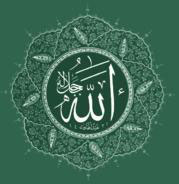| Islam
Islam arose in Arabia in the 7th century CE with a strictly unitary view of God. Muslims-adherents of Islam hold the Qur'an to be the ultimate authority, as revealed through the teachings of the prophet Muhammad. Less well-known Abrahamic religions, originally offshoots of Shi'a Islam, include the Bahá'í Faith and Druze. For Muslims, Abraham (Ibrahim) is a prophet, the "messenger of God" to whom Allah gave revelations (Quran 4:163). Abraham built the Kaaba with his first son, Isma’il – a symbol seen on every mosque. Islam considers Abraham to be the "first Muslim" - the first monotheist. Islam holds that it was Ishmael, rather than Isaac, whom Ibrahim was instructed to sacrifice. Muhammad was born an orphan in Mecca (~570-580 A.D) first raised by his grandfather, Abd al-Muttalib, and then by his uncle, Abu Talib. He lived in humble circumstances, but later achieved wealth and position at the age of twenty-five by an advantageous marriage to a wealthy widow, Khadija, who was fifteen years his senior. Her money provided him with the independence needed to investigate and appraise the religious situation in Arabia. What compelled Muhammad to undertake his world-shaking career will always remain shrouded in mystery. What is clear is that he was disturbed and disgusted by the idolatry of his contemporaries and their lack of devotion to Allah, the true God. Muhammad's lack of success in finding followers in Mecca led him to search for a new, more promising horizon. In 622 Muhammad made his famous Hijra (migration) to Yathrid (Medina), a city 250 miles northeast of Mecca that had originally been settled by Jewish tribes. The Hijra is so pivotal that 622 marks the beginning of the Islamic calendar. By 630 Muhammad returned to Mecca to become its leader, a feat accomplished more through negotiation than by force. As so happens with epic events (religious, intellectual or political), the spark of Muhammad’s revelations became less prophetic and religious and more regulatory and secular. Islam, the religion and church, became a community and a state, with Muhammad as the lawgiver, the supreme judge, the commander in chief, and the ruler. In 632 Muhammad died leaving the whole of the Arabian Peninsula embracing Islam. Islam is a monotheistic faith whose essential core of belief is the unity of Allah, a wholly transcendent God. In a religious context, Islam means "voluntary submission to God". Allah’s messager, the prophet Muhammad, is wholly human having not claim to divinity. Islamic faith requires belief in the uniqueness of God, the truthfulness of the Prophet's Mission, the divine origin of the Koran, a hierarchy of angels, and the Last Day of Judgment. The Pillars of Islam are five basic acts in
Islam, considered obligatory for all believers: Belief in angels is fundamental to the faith of
Islam. The Arabic word for angel, mal’ak, means "messenger", like its counterparts in Hebrew (malakh) and Greek
(angelos). According to the Qur'an, angels do not possess free will, and worship God in total
obedience. Angels' duties include communicating revelations from God, glorifying God, recording every
person's actions, and taking a person's soul at the time of death. They are also thought to intercede on man's
behalf. Given Islam’s later 7th-century beginnings, its religious literature draws heavily on Christian and Jewish sources. Both the Koran and Tradition contain a great deal of material that indicates a strong Talmudic and Apocalyptic influence. Islamic legal system shows influence from the Roman-Byzantine legal system, whereas philosophy, the sciences, medicine, mathematics, chemistry, physics, and astronomy, bear the direct impress of Greek thought. Notwithstanding, Arab culture has left its
permanent mark in Western culture: In “The Millennium” issue, Life magazine (Fall, 1997) listed the 100 Events of the 2nd Millennium. Important Arabic events include: • Ibn-Rushd translates Aristotle
(1169) In “Top 100 People of the Millennium”, Life magazine ranked the top 100 people into six categories. In the category of 'Thinkers', Arabic
contributors include: In the category of 'Creators', Arabic
contributors include: z
|
